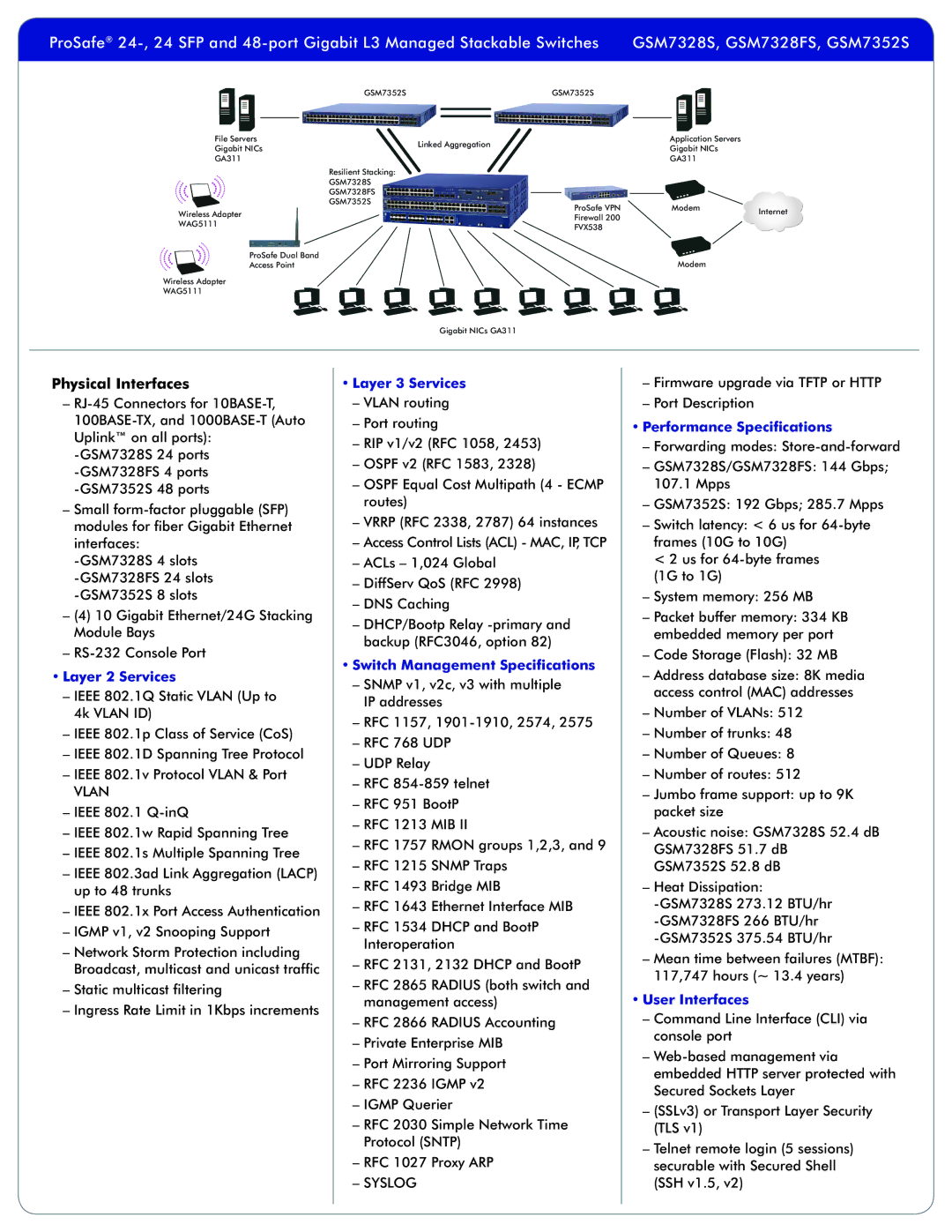Physical Interfaces
––RJ-45 Connectors for 10BASE-T, 100BASE-TX, and 1000BASE-T (Auto Uplink™ on all ports):
-GSM7328S 24 ports -GSM7328FS 4 ports -GSM7352S 48 ports
––Small form-factor pluggable (SFP) modules for fiber Gigabit Ethernet interfaces:
-GSM7328S 4 slots
-GSM7328FS 24 slots -GSM7352S 8 slots
––(4) 10 Gigabit Ethernet/24G Stacking Module Bays
––RS-232 Console Port
•Layer 2 Services
––IEEE 802.1Q Static VLAN (Up to 4k VLAN ID)
––IEEE 802.1p Class of Service (CoS) ––IEEE 802.1D Spanning Tree Protocol
––IEEE 802.1v Protocol VLAN & Port
VLAN
––IEEE 802.1 Q-inQ
––IEEE 802.1w Rapid Spanning Tree ––IEEE 802.1s Multiple Spanning Tree
––IEEE 802.3ad Link Aggregation (LACP) up to 48 trunks
––IEEE 802.1x Port Access Authentication ––IGMP v1, v2 Snooping Support
––Network Storm Protection including Broadcast, multicast and unicast traffic
––Static multicast filtering
––Ingress Rate Limit in 1Kbps increments
•Layer 3 Services ––VLAN routing ––Port routing
––RIP v1/v2 (RFC 1058, 2453) ––OSPF v2 (RFC 1583, 2328)
––OSPF Equal Cost Multipath (4 - ECMP routes)
––VRRP (RFC 2338, 2787) 64 instances ––Access Control Lists (ACL) - MAC, IP, TCP ––ACLs – 1,024 Global
––DiffServ QoS (RFC 2998) ––DNS Caching
––DHCP/Bootp Relay -primary and backup (RFC3046, option 82)
•Switch Management Specifications
––SNMP v1, v2c, v3 with multiple IP addresses
––RFC 1157, 1901-1910, 2574, 2575 ––RFC 768 UDP
––UDP Relay
––RFC 854-859 telnet ––RFC 951 BootP ––RFC 1213 MIB II
––RFC 1757 RMON groups 1,2,3, and 9 ––RFC 1215 SNMP Traps
––RFC 1493 Bridge MIB
––RFC 1643 Ethernet Interface MIB
––RFC 1534 DHCP and BootP Interoperation
––RFC 2131, 2132 DHCP and BootP
––RFC 2865 RADIUS (both switch and management access)
––RFC 2866 RADIUS Accounting ––Private Enterprise MIB ––Port Mirroring Support ––RFC 2236 IGMP v2
––IGMP Querier
––RFC 2030 Simple Network Time Protocol (SNTP)
––RFC 1027 Proxy ARP ––SYSLOG
––Firmware upgrade via TFTP or HTTP ––Port Description
•Performance Specifications ––Forwarding modes: Store-and-forward
––GSM7328S/GSM7328FS: 144 Gbps; 107.1 Mpps
––GSM7352S: 192 Gbps; 285.7 Mpps
––Switch latency: < 6 us for 64-byte frames (10G to 10G)
<2 us for 64-byte frames
(1G to 1G)
––System memory: 256 MB
––Packet buffer memory: 334 KB embedded memory per port
––Code Storage (Flash): 32 MB
––Address database size: 8K media
access control (MAC) addresses ––Number of VLANs: 512 ––Number of trunks: 48 ––Number of Queues: 8 ––Number of routes: 512
––Jumbo frame support: up to 9K packet size
––Acoustic noise: GSM7328S 52.4 dB GSM7328FS 51.7 dB GSM7352S 52.8 dB
––Heat Dissipation: -GSM7328S 273.12 BTU/hr -GSM7328FS 266 BTU/hr -GSM7352S 375.54 BTU/hr
––Mean time between failures (MTBF): 117,747 hours (~ 13.4 years)
•User Interfaces
––Command Line Interface (CLI) via console port
––Web-based management via embedded HTTP server protected with Secured Sockets Layer
––(SSLv3) or Transport Layer Security (TLS v1)
––Telnet remote login (5 sessions) securable with Secured Shell (SSH v1.5, v2)

